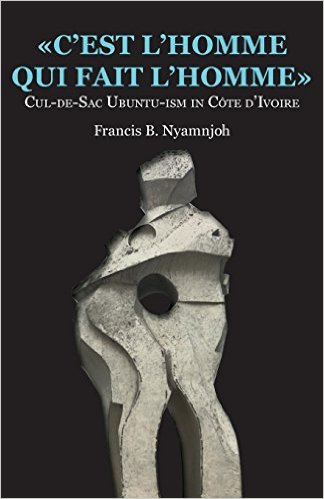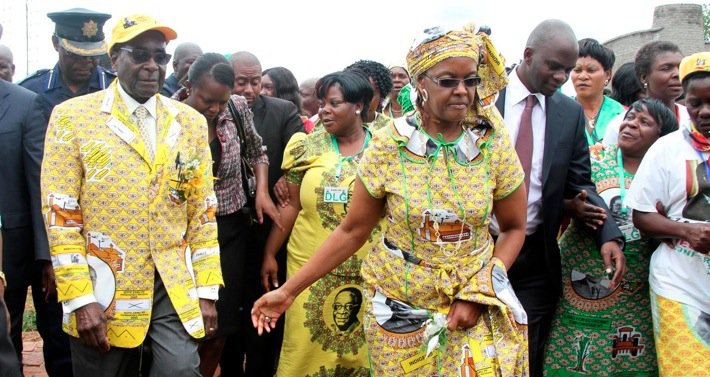Europe’s Migrant Crisis: A perspective from Francis Nyamnjoh’s ‘«C’est l’homme qui fait l’homme»: “Cul-de-Sac Ubuntu-ism in Côte d’Ivoire”
September 25, 2015
By Malizani Jimu*
 Francis Nyamnjoh is not a stranger to critical commentary. His analysis of social issues is refreshing. Take for example, his treatise on media and democracy in Africa, globalization, research ethics, chieftainship, culture and impact of colonial education in Africa. Through many distinctive, well thought through and intelligent analyses of situations both complex and ordinary Nyamnjoh has shown the world that there is always something new about Africa. His very recent works demonstrate a fusion of fiction and scholarship in a manner very reflective of reality that is also theoretically informed.
Nyamnjoh’s recent book titled: ‘«C’est l’homme qui fait l’homme»: Cul-de-Sac Ubuntu-ism in Côte d’Ivoire’ (2015) dwells on inclusivity as a social norm characteristic of Ubuntu. Other than celebrating virtues of Ubuntu as a philosophy of life, Nyamnjoh offers a useful critique of Ubuntu by showing its limitations where opportunism could be masked in opportunity. Nyamnjoh draws on commonplace experiences involving well known and less known characters. The question I would want to dwell on is not whether there is a grain of truth in Nyamnjoh’s critique, but whether there are parallels with recent experiences to what is now known as ‘Europe Migrant Crisis’.
Talking about Europe migrant crisis is not simply to understate the spatial reach of the crisis but also to take an unbalanced Eurocentric way of perceiving the crisis. We need to ponder on the genesis and the missteps of the west in the making of the current crisis. This write up does not seek to provide a historical analysis of the factors leading to the crisis, rather to demonstrate how Nyamnjoh’s book actually offers a better way of positioning the experiences of being a migrant (legality not withstanding). In a bid to do so there is need to appreciate that Europe’s migrant crisis is to a large extent due to conflict, oppression and poverty in major source countries, principally Syria, Iraq, Afghanistan and Eritrea. The receiving countries have moral duty and an economic interest to welcome (and not to) the migrants regardless of the label used to describe the persons in motion.
Certainly the genesis and outcome indicate that the migrant crisis is a crisis of peace and insecurity. Recognizing it as such there is no need to underplay the political and economic dimensions both in the sending and receiving countries and regions. Nyamnjoh calls on us all to consider it as a crisis of humanity. By underscoring the humanity of persons in motion and the negotiations that is involved in the process of moving and between those who are involved as migrants, the host communities and the communities and relations in the places of origin, Nyamnjoh would argue that his book is actually a crisis of everything above. Nyamnjoh challenges us to begin a process of self-reflection with the goal of rediscovering the humanity in us and the other, those on the move and the policy and opinion leaders at all levels. This is the central thesis among other possible readings of the text Ubuntuism given that Nyamnjoh gives prominence to the notion of ‘Inclusivity’. The introduction to his book actually opens with inclusivity as core virtue of Ubuntu.
What the migrants are seeking from host communities is not just a safe haven for their mortal bodies but also for their souls, values and beliefs. Expecting immigrants to melt and disappear in the name of assimilation could be an annihilating experience. The violence visited upon the migrants in their places of origin is catastrophic to their Ubuntu as it is the cold and hostile reception in places like Hungary. To bring home this understanding of Ubuntu or the crisis of Ubuntu migrant experiences convey in Europe’s Migrant Crisis, Nyamnjoh quotes one of the beacons of hope in hopeless situations, Archbishop Desmond Tutu, urging us that Ubuntu is the quest for “social harmony”, a categorical imperative – “the summum bonum – the greatest good” – and “Anything that subverts or undermines this sought-after good is to be avoided like the plague”. Ubuntu is a virtue as powerful as hardworking spirit which many migrants have demonstrated throughout history. It is evident, as Nyamnjoh shows for various characters in his book, that Migrants are willing to undertake menial jobs that citizens shun or enter into grudgingly.
Ubuntu calls for shared intricacies and entanglements. As Nyamnjoh also sees it, a person is a person because of another. Essentially it follows that human life is a network of interconnected and interdependent socialities in which agency is both an aspiration and a constantly negotiated or domesticated reality, for individuals and collectivities alike. Nyamnjoh underscores the value of interconnectedness and the need for inclusivity by showing us that if humans pride themselves with the capacity to harness nature, it is only appropriate to make human nature part of the bargain. Nyamnjoh appreciates situations where an individual toiling away in a distant land might be a victim of various claims by family, friends and acquaintances who are not themselves ready to reciprocate when s/he or others come knocking with claims and demands of their own. Given these occurrences Nyamnjoh suggests the need to differentiate opportunity from opportunism and when relationship claims be taken seriously, and when should they be ignored. Inclusivity is an important virtue even as Europe’s Migrant crisis is a story of people generally looking for opportunity and opportunism for those who are not desperate as for those who have taken advantage of the situation as smugglers.
Being a migrant is a step in a long chain of entanglements and intricacies. Migrants always maintain close ties with people and places from which they have historical roots. To the people left behind, migrants become a source of livelihood. As Nyamnjoh has shown also in relation to Cameroon, migrants abroad can be compared to zombies in a form of witchcraft – nyongo – which privileges zombification of its victims over instant gratification through instant and total death. Nyamnjoh shares experiences of some characters, Daou and Amélie, who liken themselves to zombies in similar fashion, forced by duplicitous family and friends back in Côte d’Ivoire, such as Gohou and Nastou. But given that migrants abroad are only like zombies, they sometimes complain and even return occasionally, only to be met with disappointment and shattered dreams. The moral of the stories is that it is not always guaranteed that their efforts are appreciated. This is also the case of renowned Togolese international footballer Emmanuel Adebayor who has played for several top European clubs, including Monaco, Arsenal, Manchester City and Tottenham Hotspurs, and who won the African footballer of the year award in 2008. A detailed Facebook posting in English and French by Emmanuel Adebayor25, show him complaining about the ingratitude that his Togolese family has repeatedly shown him despite his generosity with his riches in their regard.
Once Europe’s Migrant Crisis is resolved or overtaken by other important issues and it is forgotten for some time, Nyamnjoh’s call for inclusivity will not cease to entice and trouble the consciousness of migrants, host communities and policy makers both in Europe, Asia and Africa. Nyamnjoh’s rendition of ‘Ubuntu’ as inclusivity will remain a significant issue of interest to scholarship in the social sciences and in everyday discourses until another crisis is encountered and/or resolved.
*Source Malizani Jimu
Francis Nyamnjoh is not a stranger to critical commentary. His analysis of social issues is refreshing. Take for example, his treatise on media and democracy in Africa, globalization, research ethics, chieftainship, culture and impact of colonial education in Africa. Through many distinctive, well thought through and intelligent analyses of situations both complex and ordinary Nyamnjoh has shown the world that there is always something new about Africa. His very recent works demonstrate a fusion of fiction and scholarship in a manner very reflective of reality that is also theoretically informed.
Nyamnjoh’s recent book titled: ‘«C’est l’homme qui fait l’homme»: Cul-de-Sac Ubuntu-ism in Côte d’Ivoire’ (2015) dwells on inclusivity as a social norm characteristic of Ubuntu. Other than celebrating virtues of Ubuntu as a philosophy of life, Nyamnjoh offers a useful critique of Ubuntu by showing its limitations where opportunism could be masked in opportunity. Nyamnjoh draws on commonplace experiences involving well known and less known characters. The question I would want to dwell on is not whether there is a grain of truth in Nyamnjoh’s critique, but whether there are parallels with recent experiences to what is now known as ‘Europe Migrant Crisis’.
Talking about Europe migrant crisis is not simply to understate the spatial reach of the crisis but also to take an unbalanced Eurocentric way of perceiving the crisis. We need to ponder on the genesis and the missteps of the west in the making of the current crisis. This write up does not seek to provide a historical analysis of the factors leading to the crisis, rather to demonstrate how Nyamnjoh’s book actually offers a better way of positioning the experiences of being a migrant (legality not withstanding). In a bid to do so there is need to appreciate that Europe’s migrant crisis is to a large extent due to conflict, oppression and poverty in major source countries, principally Syria, Iraq, Afghanistan and Eritrea. The receiving countries have moral duty and an economic interest to welcome (and not to) the migrants regardless of the label used to describe the persons in motion.
Certainly the genesis and outcome indicate that the migrant crisis is a crisis of peace and insecurity. Recognizing it as such there is no need to underplay the political and economic dimensions both in the sending and receiving countries and regions. Nyamnjoh calls on us all to consider it as a crisis of humanity. By underscoring the humanity of persons in motion and the negotiations that is involved in the process of moving and between those who are involved as migrants, the host communities and the communities and relations in the places of origin, Nyamnjoh would argue that his book is actually a crisis of everything above. Nyamnjoh challenges us to begin a process of self-reflection with the goal of rediscovering the humanity in us and the other, those on the move and the policy and opinion leaders at all levels. This is the central thesis among other possible readings of the text Ubuntuism given that Nyamnjoh gives prominence to the notion of ‘Inclusivity’. The introduction to his book actually opens with inclusivity as core virtue of Ubuntu.
What the migrants are seeking from host communities is not just a safe haven for their mortal bodies but also for their souls, values and beliefs. Expecting immigrants to melt and disappear in the name of assimilation could be an annihilating experience. The violence visited upon the migrants in their places of origin is catastrophic to their Ubuntu as it is the cold and hostile reception in places like Hungary. To bring home this understanding of Ubuntu or the crisis of Ubuntu migrant experiences convey in Europe’s Migrant Crisis, Nyamnjoh quotes one of the beacons of hope in hopeless situations, Archbishop Desmond Tutu, urging us that Ubuntu is the quest for “social harmony”, a categorical imperative – “the summum bonum – the greatest good” – and “Anything that subverts or undermines this sought-after good is to be avoided like the plague”. Ubuntu is a virtue as powerful as hardworking spirit which many migrants have demonstrated throughout history. It is evident, as Nyamnjoh shows for various characters in his book, that Migrants are willing to undertake menial jobs that citizens shun or enter into grudgingly.
Ubuntu calls for shared intricacies and entanglements. As Nyamnjoh also sees it, a person is a person because of another. Essentially it follows that human life is a network of interconnected and interdependent socialities in which agency is both an aspiration and a constantly negotiated or domesticated reality, for individuals and collectivities alike. Nyamnjoh underscores the value of interconnectedness and the need for inclusivity by showing us that if humans pride themselves with the capacity to harness nature, it is only appropriate to make human nature part of the bargain. Nyamnjoh appreciates situations where an individual toiling away in a distant land might be a victim of various claims by family, friends and acquaintances who are not themselves ready to reciprocate when s/he or others come knocking with claims and demands of their own. Given these occurrences Nyamnjoh suggests the need to differentiate opportunity from opportunism and when relationship claims be taken seriously, and when should they be ignored. Inclusivity is an important virtue even as Europe’s Migrant crisis is a story of people generally looking for opportunity and opportunism for those who are not desperate as for those who have taken advantage of the situation as smugglers.
Being a migrant is a step in a long chain of entanglements and intricacies. Migrants always maintain close ties with people and places from which they have historical roots. To the people left behind, migrants become a source of livelihood. As Nyamnjoh has shown also in relation to Cameroon, migrants abroad can be compared to zombies in a form of witchcraft – nyongo – which privileges zombification of its victims over instant gratification through instant and total death. Nyamnjoh shares experiences of some characters, Daou and Amélie, who liken themselves to zombies in similar fashion, forced by duplicitous family and friends back in Côte d’Ivoire, such as Gohou and Nastou. But given that migrants abroad are only like zombies, they sometimes complain and even return occasionally, only to be met with disappointment and shattered dreams. The moral of the stories is that it is not always guaranteed that their efforts are appreciated. This is also the case of renowned Togolese international footballer Emmanuel Adebayor who has played for several top European clubs, including Monaco, Arsenal, Manchester City and Tottenham Hotspurs, and who won the African footballer of the year award in 2008. A detailed Facebook posting in English and French by Emmanuel Adebayor25, show him complaining about the ingratitude that his Togolese family has repeatedly shown him despite his generosity with his riches in their regard.
Once Europe’s Migrant Crisis is resolved or overtaken by other important issues and it is forgotten for some time, Nyamnjoh’s call for inclusivity will not cease to entice and trouble the consciousness of migrants, host communities and policy makers both in Europe, Asia and Africa. Nyamnjoh’s rendition of ‘Ubuntu’ as inclusivity will remain a significant issue of interest to scholarship in the social sciences and in everyday discourses until another crisis is encountered and/or resolved.
*Source Malizani Jimu

























